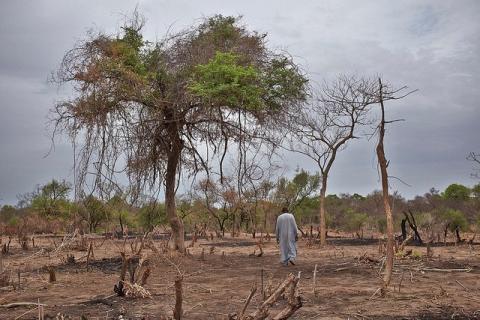Economic incentives help curb deforestation in Africa, PhD research finds
PhD research by Tung Nguyen Huy delves into the economics of deforestation and land degradation in sub-Saharan Africa. His dissertation shows that financial incentives are a powerful way to encourage farmers to sustainably manage and protect the land.
With nearly four million hectares of forest disappearing each year, sub-Saharan Africa has experienced the world's highest rate of forest loss between 2010 and 2020. At the same time, a staggering 65% of agricultural land in the region has been degraded.
Economic causes of deforestation and land degradation
At the root cause of these devastating losses are unsustainable farming practices. Forests and other natural landscapes are cleared to make way for agricultural fields, causing a growing crisis that is threatening the climate and the livelihoods of millions.
What are the drivers of forest land conversion in sub-Saharan Africa? According to Tung Nguyen Huy, the main reasons are economic. The rapid population growth is driving up the demand for agricultural land, and declining productivity on existing farmland makes it difficult for farmers to produce enough food without converting the natural landscape into agricultural fields.
Addressing these economic drivers of unsustainable forest and land management practices is important, Nguyen Huy says, because it may clear the way for more sustainable practices that don't have a devastating impact on people and the planet. “It also strengthens climate change adaptation and mitigation for the most vulnerable populations.”

Many farmers in sub-Saharan Africa either lack knowledge of sustainable farming techniques and their benefits, or don't have access to them.
Promising projects in Burkina Faso and Ghana
Sustainable alternatives to current forest and land management practices exist, but the diffusion of such techniques is slow in sub-Saharan Africa. “Many farmers either lack knowledge of these techniques and their benefits, or don't have access to them,” Nguyen Huy explains.
He examined the effects of three innovative projects of the Development Impact Evaluation (DIME) group of the World Bank, aimed at tackling unsustainable forest and land management in Burkina Faso and Ghana in different ways. The results of his PhD research are promising. Providing small farmers with financial incentives and knowledge proves to be a powerful way to accelerate the diffusion of sustainable practices.
The power of financial incentives
For instance, small farmers in Burkina Faso were not only more likely to adopt sustainable farming practices when they received financial compensation, but also experienced improved agricultural productivity. And in Ghana, providing small farmers with subsidies, labor assistance and consultation led to an increased adoption of sustainable practices, while also encouraging farmer-to-farmer learning.
A third project, also in Burkina Faso, raised awareness about the detrimental effects of forest fires in local forest communities and helped them implement forest fire containment measures. Nguyen Huy found that the project briefly led to a reduced number of forest fires during the peak fire season, but that this reduction did not lead to a significant increase in forest cover.
Tackling the economic drivers of deforestation
Tung Nguyen Huy's doctoral research highlights the pressing need to address the economic drivers of unsustainable forest and land management. It shows that financial incentives and knowledge dissemination can encourage sustainable farming practices, improve agricultural productivity, and – ultimately – halt deforestation and land degradation in sub-Saharan Africa. “I hope that the results of the dissertation will bring about meaningful improvements for the livelihoods of forest communities and for the environment.”
-

Tung Nguyen Huy
Tilburg School of Economics and Management (TiSEM)Tung Nguyen Huy defends his PhD thesis on 19 september 2023 (16.30h) in the Auditorium of Tilburg University. A livestream will be available. Title thesis: Fostering sustainable land management in Sub-Saharan Africa: Evidence from Ghana and Burkina Faso. Supervisor: Prof. D.P. van Soest. Co-supervisor: Dr. P.S. Dalton.
The full PhD thesis is available here.
Note for the press
For more information, please contact Tung Nguyen Huy directly at t.nguyenhuy@tilburguniversity.edu, or reach out to TiSEM's science communicator Laura van Gelder at l.f.vangelder@tilburguniversity.edu.
